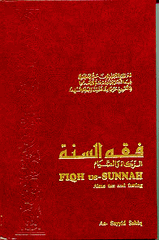Fiqh Assunah

Fiqh-us-Sunnah, Volume 3: Making Up Missed Days of Ramadan
Making up missed days of Ramadan is an obligation that need not be fulfilledimmediately because the time for fulfilling is very wide and one may perform itat any time. This is also the case with the fast of expiation. It has beenauthentically reported that 'Aishah would make up her missed days during themonth of Sha'ban (the month preceding Ramadan), and that she did not performthem immediately even if she had the ability to do so.
Observing the fast of Ramadan and making up the days are the same withrespect to the fact that if one day of Ramadan is missed, then only one dayneeds to be made up. There is no additional penalty. They differ about the factthat when a person makes up the missed days he need not do so on consecutivedays. This is because Allah says: "For him who is sick or on a journey,[the same] number of other days"--that is, whoever is sick or travelingand breaks the fast must fast the same number of days that he missed, consecutivelyor unconsecutively.
Allah has ordered the fast in a general manner without any restrictingclauses.
As for making up the missed days of Ramadan, ad-Daraqutni recorded from Ibn'Umar that the Prophet said: "If you wish, make them on nonconsecutivedays and if you wish on consecutive days."
If one delays performing the missed days of fasting until the next Ramadancomes, he is to fast the present Ramadan and then make up the days from theprevious Ramadan. There is no ransom payment to be made, regardless of whetherthe person delayed the fasting due to some acceptable excuse or not. This isthe opinion of the Hanafiyyah and al-Hassan al-Basri. Malik, ash-Shaf'i, Ahmad,and Ishaq agree that there is no ransom payment if the fasting was delayed dueto some excuse, but they differ when the fasting was delayed without anyacceptable excuse. In such a case, according to them, the person should fastthe present Ramadan and then make up the days he missed from the previousRamadan along with a ransom payment of a mudd of food given in charity each day.It should be noted that they have no acceptable evidence for that opinion.Apparently, the correct opinion is that of the Hanafiyyah, as there is nolawmaking without an authentic legal text to support it (that is, a Qur'anicverse or hadith).
Volume3, Page 143: Whoever dies and still had some days of Ramadan to make up
The scholars agree that if an individual dies and has missed some prayersduring his life, his guardian or heir is not to perform those prayers on hisbehalf. Similarly, if one does not have the ability to fast, no one is to fastfor him while he is alive. There is a difference of opinion over the case ofone who dies and has not made up some days of fasting although he had theability to do so.
Most scholars, including Abu Hanifah, Malik, and the Shaf'iyyah, say thatthe guardian or heir is not to fast on such a person's behalf, but is to feedone person a day for the missed days. The chosen opinion, however, among theShaf'iyyah is that it is preferred for the guardian to fast on the deceased'sbehalf, thus fulfilling his duty. There is therefore no need for him to feedanyone.
The meaning of guardian is near relative, whether it be an agnate or an heiror someone else. If a non-relative fasts for the deceased, it will only bevalid if he got the permission of the guardian.
The proof for the preceding is what Ahmad, al-Bukhari, and Muslim recordedfrom 'Aishah. The Messenger of Allah, upon whom be peace, said: "If onedies and has some fasts to make up, then his guardian' should fast on hisbehalf." Al-Bazzar added the words: "If he wishes to do so, while Ibn'Abbas related that a man came to the Prophet and said: "O Messenger ofAllah, my mother died and a month's fasting was due from her. Should I fast onher behalf?" The Prophet asked: "If your mother had a debt would youfulfill it for her?" He said, "Yes." The Prophet observed:"A debt to Allah has more of a right to be fulfilled." This isrelated by Ahmad, atTirmizhi, an-Nasa'i, Abu Dawud, and Ibn Majah.
An-Nawawi [one of the most knowledgeable of the Shaf'iyyah] says: "Thatstatement is the most authentic one, and we follow it. This is the opinion thathas been determined to be correct according to our companions in both hadithand fiqh."
Volume3, Page 144: Places where the day is extremely long and the night is short
Scholars differ about what the Muslims who are in areas where the day isextremely long and the night is short should do. What timings should theyfollow? Some say they should follow the norms of the areas where the Islamiclegislation took place--that is, Makkah or Madinah. Others say they shouldfollow the timings of the area that is closest to them which has normal daysand nights.
